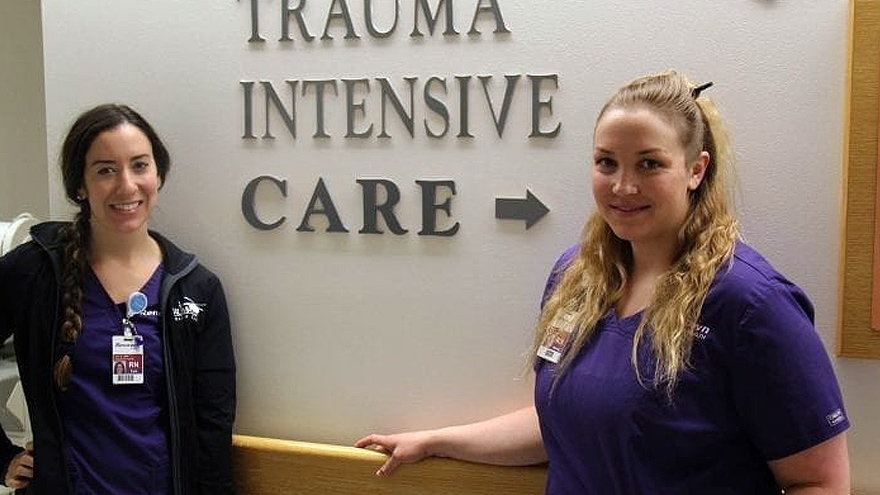Search
-
5 Tips to Protect Your Knees from Pain and Injury
Knee pain and injury can restrict movement and make it difficult to be active, but studies show that the right type of exercise can help prevent these issues. It’s no wonder our knees are highly prone to injury. They house a complex network of muscles, ligaments and joints, and are crucial to our agility and daily movements. If you are experiencing knee pain, it’s important to not ignore this message from your body. While it’s fairly common to have occasional aches, if the pain limits your ability to perform normal daily activities like climbing stairs or walking with ease, have a medical professional check it out. “The take-home message here is to listen to your body,” says Amanda Henriques, PT, DPT at Renown Physical Therapy. “We are all built differently and respond to exercise in different and unique ways. Running may feel great for one person, but always lead to injury for another.” At any age, it's important to protect and strengthen your knees to help prevent pain and injury. Here are five tips from our experts: 1. Strengthen your muscles Choose exercises that focuses on the muscles around your kneecaps, hips and pelvis and places extra emphasis on your core. These muscles will absorb some of the stress places on your knees, helping them stay balanced and stable. 2. Maintain a healthy weight Each pound of body weight produces five pounds of force on the knee. If you need to shed weight, start with low-impact activities to avoid increased stress to your joints. 3. Pick the right exercise Opt for exercise that put less stress on your knees, such as cycling, walking or swimming. Choose flat surfaces when walking for exercise and avoid activities that put extra stress on your knees, such as deep knee bends or downhill running. 4. Warm up before working out Don’t overdo the workouts in length or intensity, and stretch after exercise to help prevent injury. 5. Avoid high heels Wear shoes with good arch support specific to your choice of exercise that provide a stable base for your feet and legs. Replace running shoes every 300 to 500 miles. Other athletic shoes should be replaced after 500 miles of wear. These tips can help keep your knees strong and prevent injury. But if you experience an accident or trauma, seek medical attention and follow up with any rehabilitation recommendations you receive. Depending on the injury, your doctor may recommend physical therapy, where you will be guided through individualized exercises to strengthen and heal. “If you listen to your body and take the appropriate preventative measures, you can find the right type of exercise to keep you happy, healthy and fit for life,”
Read More About 5 Tips to Protect Your Knees from Pain and Injury
-
Air Guard RN Makes an Impact in Community and Beyond
Everyday, Renown salutes its more than 150 active military and veterans on staff. Becca Gilbert, a Renown trauma nurse, is an example of the many outstanding service members at Renown who are serving both their country and their community. Becca Gilbert, BSN, RN, wears many uniforms. When she’s not wearing scrubs in her role as a trauma nurse in the intensive care unit of Renown Regional Medical Center, she’s wearing fatigues as a first lieutenant in the Nevada Air National Guard. “Service is huge,” says Becca Gilbert, RN, of her role in the Air Guard. “It’s something that is ingrained in me and a big part of who I am as a person. I find a lot of pride in being a part of something that is bigger than what is going on in my world.” Renown Health was named one of 15 recipients across the nation — and the only health system in the U.S. — for the Department of Defense’s highest employer award, the Secretary of Defense Employer Support Freedom Award, for exceptional support of its military employees. The Employer Support of the Guard and Reserves and Renown held a ceremony June 29 to recognize the award and to honor representatives of Renown who currently serve in the Guard and Reserves. With her Air Guard background, Gilbert is preassigned veteran patients at the Renown ICU. She says she’s able to relate to the veterans and their families and create a quick bond with them. “I’ve been assigned patients who are guard members with traumatic injuries — it’s good but hard,” Gilbert explains. “But I really love working with patients who are veterans.” Gilbert’s first career was as a veterinarian technician. Then enlisted in the Nevada Air National Guard in August 2008 — following in her father’s footsteps — and trained to serve as an EMT. While she was a medic, she went to nursing school for her second bachelor’s degree and was able to commission as an officer after graduation. Serving Our Community Gilbert says her work in the guard offers benefits that help with her job responsibilities at Renown, where she’s worked for four years. “At Renown, we are really a team and rely on each other to make sure there are good outcomes,” she says. “In the guard, officers are often put in charge, which teaches you a lot of things — organization, decision making and thinking of others. I think all of those things go hand-in-hand with my role as a nurse, especially in the ICU. People in the guard count on you as an officer and leader, and that is really important in the ICU when patients are counting on you for a positive outcome.” Gilbert’s responsibilities in the guard vary, including training for disaster relief missions and ensuring service members are fit and healthy enough to perform their jobs. “Training is a large part of the military — trauma training, physical fitness training and staying current on certifications,” she says. Locally she also leads the Self Aid Buddy Care program, a United States Air Force program that encompasses basic life support and limb-saving techniques to help wounded or injured personnel survive in medical emergencies until medical help is available. With the guard, Gilbert has also been involved in a bleeding-control program for volunteers in the community. She teaches community groups how to stop bleeding if they are a bystander to a car accident or other type of event, and is working with Renown trauma surgeon Marty Bain, M.D. to implement the program at Renown as well. Making a Difference Abroad In January, Gilbert was presented with an opportunity through the Nevada Guard State Partnership Program to travel outside the United States to the Kingdom of Tonga in the South Pacific and work at the Women and Children Crisis Centre, which assists families who are dealing with domestic violence. Gilbert praised the women who work at the center for their efforts towards change, as she says domestic violence is common in Tonga. “The women who work at the Women and Children Crisis Centre are pioneers,” she says. “They are trying to make changes by documenting what is going on and providing statistics to the lords and kings of Tonga. Some of it still isn’t accepted, but they continue to help the women and children of Tonga. They are helping so many people.” Renown Health salutes Gilbert for her tireless service to her country and her community here at home.
Read More About Air Guard RN Makes an Impact in Community and Beyond
-
How Do I Prepare for Surgery?
Renown’s team of nurses and respiratory therapists discuss what you need to know before undergoing surgery, including fasting guidelines and how to improve recovery. There are several things to know before you undergo surgery, including steps to prepare at home in advance of your procedure. Fasting Guidelines: No solid foods eight hours prior to surgery You may have clear liquids three hours before your surgery. Clear liquids include water, apple juice and lemon or lime-flavored soda water (not cola). In addition, do not chew or smoke tobacco (regular or e-cigarettes) after midnight the night before your surgery, unless instructed by your doctor or anesthesiologist.
-
True Grit Healing a Cowboys Heart
At 85, James Domingos is still enjoying life as a cowboy, thanks to a transcatheter aortic valve replacement. Always rolling with the punches when it comes to life, 85-year-old James Domingos faced his health issues with the same grit. For many years, he roped cattle for friends and rounded up horses for the Bureau of Land Management. In recent years, a pacemaker controlled the rhythm of his heart, but didn’t slow him down. “We used to be able to take walks for 15 minutes in one direction and take the dog,” says Domingos’ wife, Joy. “Then it got to be less and less.” Tests at Renown Health revealed a heart valve was nearly closed. His heart doctor, Jake Ichino, MD, FACC, FSCAI, suggested a transcatheter aortic valve replacement, known as TAVR, which repairs a heart valve without removing the damaged valve. The procedure is recommended for patients who are at high risk for open heart surgery.
-
Use This, Not That: 8 Healthy Cooking Swaps
If you’re looking for an easy way to add a nutritious kick to your favorite brownie, pizza or cream sauce recipe, check out these healthy ingredient substitutions. There’s no doubt about it: People love decadent, creamy and starchy dishes. If you’re prone to avoiding your favorite guilty pleasure because it’s not a healthy choice, there are a few easy, healthy and delicious substitutions you can add to your cooking or baking routine to satisfy your cravings. Here are eight of our favorite healthy substitutions you might have in your kitchen right now: Baking Swaps Avocados for Butter While this might not sound like an appetizing addition, avocado's creamy texture is similar to butter and can easily be added to brownie and cookie recipes. Avocados are high in healthy fats that help to lower cholesterol and are lower in saturated fats. They also can add vitamin E, fiber and potassium to your baked goods. Swap Amount: Substitute 1 cup blended avocado per 1 cup butter. Bananas for Oil Bananas are a tasty option to replace the use of oil in baking recipes. While oil is higher in fat and calories, bananas can provide potassium, fiber, vitamin B6 and all-natural sweetness to your recipe. Do take into account that bananas are higher in sugar and carbohydrates. Swap Amount: Substitute 1 cup of mashed bananas per 1 cup of oil. Beans for Flour You might not typically think of beans as a substitution, but they can add a lot of nutritional benefits to your treats. High in protein, fiber, folate, magnesium and phosphorous, beans are a great substitution for traditional flour in recipes and create a moist and dense texture to your baked goods. Swap Amount: Substitute 1 cup of blended beans (about a 15 ounce can) per 1 cup of traditional flour. Or, Wheat Flour for White Flour If the bean substitution doesn’t appeal to you, try substituting at least half or all of your unbleached white flour for whole wheat flour. Keep in mind for every cup of whole wheat flour you use, add another 1/4 cup of water to your recipe. This will add more fiber, protein, B vitamins, and several minerals for your baking recipe and scrumptious treats. Chia Seeds or Flax Seeds for Eggs This is a great substitution if you're allergic to eggs or have a vegan diet, but still want to enjoy desserts and breads. Chia and flax seeds are high in omega-3 fatty acids and calcium along with fiber, vitamins and minerals to help promote healthy digestion. This substitution will not provide as much protein as an egg would; however, there is less cholesterol and saturated fat. Swap Amount: Combine 1 tablespoon of ground chia or flax seeds mixed with 3 tablespoons of water, stir and let sit for 15 minutes. Equals one whole egg equivalent. Cooking Swaps Nonfat Greek Yogurt for Mayonnaise Making this switch is an easy replacement for sauces and dressings. Nonfat Greek yogurt is significantly lower in fat and calories and higher in protein. With the added protein, you will feel fuller longer throughout the day. Swap Amount: Substitute equal parts nonfat Greek yogurt for mayonnaise. Try mixing it into a cheese sauce or add lemon juice and spices for a creamy salad dressing. Lemon Juice or Vinegar for Salt If you are worried that your food will be bland, try this swap to lower added salt and still enjoy flavor while creating a fresh, tangy twist to the meal. There are a lot of varieties -- red wine, apple cider and balsamic -- each enhancing your dish with a different flavor. Swap Amount: Experiment by using half the amount of vinegar or lemon juice per the amount of salt your recipe calls for. Cauliflower for Pizza Crust Try a new twist on pizza by switching out its carbohydrate dense crust with fresh cauliflower. This substitution is lower in calories, fat, and simple carbohydrates while increasing your vitamin C and vegetable intake for the day. Swap Amount: Add one egg per every head of cauliflower and season with spices to taste, for a medium sized pizza. Or, Mashed Potatoes Preparing a homemade cauliflower pizza crust can be time consuming, so an easier exchange might be to substitute mashed cauliflower for mashed potatoes, which are higher in starches, calories and carbohydrates. Swap Amount: Boil and puree a medium size head of cauliflower. Add a splash of low fat milk and season to taste. Zucchini or Squash for Spaghetti Another great way to add vegetables to your meals is to exchange ribbons of zucchini or spaghetti squash for spaghetti noodles. This substitution helps to reduce calories and carbohydrates and zucchini is rich in vitamin A. Experiment with different sauces and spices to create a variety of dishes. Swap Amount: For zucchini ribbons, try using a mandolin or a peeler. When preparing spaghetti squash, cut it in half and lay face down in an oven safe pan. Add 1/2 inch of water to the bottom of the pan for more tender spaghetti strings (optional). Cook for 30 to 45 minutes until tender. Lie the squash face up, letting it slightly cool, and then use a fork to gently pull the squash from the peel, separating into strands. Remember: Some of these substitutions will affect the taste and texture of your recipes, so it is essential to play with the ratios to find the perfect fit for you. Consume a variety of foods, eat treats in moderation, and incorporate frequent physical activity to keep a well balanced, healthy lifestyle.
-
The Journey Within: Helping Others Through Grief
Learn more about a Renown Health nurse who formed a nonprofit to help other families through loss. After the unexpected loss of her young husband, a Renown Health nurse turned her grief into helping other families navigate the loss of a family member. Jen Walker, RN, MSN, director of clinical excellence, lost her high school sweetheart and husband of eight years when he passed away in October 2015, while their two boys, age 7 and 9, lost their father. Walker, a nurse at Renown since 2003, was overwhelmed by the outpouring of support she received from the Reno community. It inspired her to want to help others in the same situation. “After Travis passed, the community did some amazing things for me,” Walker says. “I got really motivated to do the same thing and to give back, so that’s when I came up with starting The Journey Within.” The Journey Within organization provides support and resources for young families who have lost a close family member. Before officially starting her organization, Walker used some of the money she received after her husband passed and personally donated to three families. And with the help of four board members, Jen officially started The Journey Within in February 2017, and they have helped six families so far. One of the board members is her sister, Anny Goff. “She thought of creating this foundation in the darkest time of her family’s life,” Goff says. “She knew there would be other families that would need help and support and immediately wanted to help others. It showed incredible strength and courage to keep moving forward.” Nursing Careers at Renown Health Nurses at Renown Health demonstrate a commitment to patients and their families through the integration of care, clinical expertise, education, evidence-based practice and the pursuit of quality patient outcomes. Learn more about our mission, vision and values and the benefits of a career in nursing at Renown Health today. Explore Nursing at Renown Walker’s organization supports families through financial donations, which she funds through two yearly fundraisers. The Travy Tourney is a golf tournament held in memory of Travis, and the “Let’s Toast to Travis Fundraiser” event raffles prizes and merchandise. Along with financial support, The Journey Within helps families connect with other community resources, such as counseling and grief therapy services. Walker hopes to expand her nonprofit’s fundraising and support for families beyond the Reno-Tahoe community. Because of her outstanding work at Renown and in the community, Walker recently received a 20 Under 40 award from the Reno-Tahoe Young Professionals Network. She has also received a Women of Achievement award, a Leader of the Quarter award and has been nominated four times for Northern Nevada Nurses of Achievement. “She is strong and resilient and cares a lot about people,” says Jen Richards, chief nursing officer, acute care services. “She never settles for the status quo and is always pushing our team to do better.” In navigating her own loss and starting a nonprofit to give back, Walker has learned a lot about the community. “I’ve gained a tremendous amount of respect for the community as a whole, but especially for the young community,” she says. “Seeing the young people in the community who have been willing to give back and live really selflessly has been amazing to me.” As someone who lost her husband, helping young families who have gone through the loss of a close loved one can hit close to home for Walker, but that doesn’t stop her — it fuels her. “That’s one of the hardest parts about doing this — it takes you back a little bit,” she says. “But it’s just a very good reminder of ‘why.’ Because when I get to talk with these families, I realize that now I am that person who is there to listen. I just want them to know that they’re talking to someone who’s been through something similar.”
Read More About The Journey Within: Helping Others Through Grief
-
Why Can't I Eat Before Surgery?
If you’re having surgery on your shoulder, why does it matter what’s in your stomach? We asked Dr. Matthew Hoberg to explain more about pre-surgery directives, including fasting. If you have an upcoming surgery, your care team likely gave you instructions to fast before your procedure. But why? We asked Matthew Hoberg, M.D., medical director of Renown Surgical Services, to explain why it’s important to forgo food and drinks before surgery. Why are patients instructed to fast before surgery? Regardless of surgery type or site, we want the stomach to be empty before having anesthesia, because anesthesia can reduce your body’s ability to protect and prevent food or acids from the stomach from entering the lungs. Normally, your body is able to prevent this, but anesthesia medicines make it harder for your body to do so. When food or liquids from the stomach get into the lungs, doctors call it “aspiration.” This is rare, but can be dangerous if it does happen. Solid foods and liquids leave the stomach at different rates too. Solid food takes longer to empty from the stomach than liquids, so the time to stop eating solids (eight hours) is longer than that for clear liquids (two hours). The body has energy reserves to produce needed nutrients and fuel during fasting. Recently, studies have shown it is important to stay hydrated and have some carbohydrates in clear liquids up to two hours before surgery, so clear liquids are allowed until two hours before surgery. There are also special rules for babies and young children who need surgery. For example, you may give breast milk up to four hours before surgery. If your baby drinks formula, you should stop six hours before surgery, and all solid foods you should stop eight hours before. Your child’s doctor or nurse will give you exact instructions. What if you show up for surgery and have broken the no-eating rule? Will surgery be re-scheduled? If patients have not followed the fasting guidelines, surgery will be postponed or rescheduled due to the possible increased risk associated with not having an empty stomach. The exception would be emergency surgery that cannot be delayed in which case special precautions are taken to help prevent anything from getting into the lungs. What other pre-operative rules should be followed to the letter? All instructions given to patients before their surgery or procedure should be followed. There are specific medical reasons behind all the instructions and they are designed for safety — to minimize risks, lower complications like infections and enhance the recovery process to help patients get back to normal as quickly as possible. Also, many patients ask if they should continue taking medications before surgery. The answer is: It depends. Your doctor or nurse will tell you which medicines you should take and when. Some medicines need to be stopped before surgery. But for others, it’s important you keep taking them as usual. You may also get new medicines to take before surgery. You may be asked to take some medications before surgery as part of advanced pain management protocols. If you need to take medicine right before your surgery, you can take it with a sip of water.
-
Do You Have Prediabetes? Three Things to Know
Most people don’t even realize their blood sugar is higher than normal on a daily basis. This condition means they are on the borderline of having Type 2 diabetes. Learn more about what it means to have prediabetes. Also learn risk factors for Type 2 diabetes and how it can be prevented. ‘Prediabetic’ is a term you may have heard before, but few understand what it means. Fewer still understand how to prevent the subsequent diagnosis of “diabetic.” Here are three things you need to know. 3 Facts About Prediabetes One out of three U.S. adults has prediabetes, yet don’t know it. Prediabetes means your blood sugar (glucose) level is higher than normal but not high enough to be diagnosed with diabetes. When you have prediabetes, your body still produces insulin, but the insulin is not as efficient at removing the sugar in your blood. So your overall blood sugar remains high — causing insulin resistance. People with prediabetes are at high risk for Type 2 diabetes, heart disease and stroke. If you become diabetic, there are further complications to your kidneys, feet, eyes and skin. Risk for diabetes increases with age. According to the Centers for Disease Control and Prevention (CDC), among adults ages 18-44, only 4 percent have diabetes. For ages 45-64, 17 percent have diabetes, and among those ages 65 years and older, 25 percent have diabetes. If prediabetes goes untreated, it often leads to Type 2 diabetes within five years. Current estimates indicate 1 in 3 Americans has prediabetes. Being overweight is risk factor for diabetes. Other risk factors include having high blood pressure, having high cholesterol, being inactive and giving birth to a baby weighing more than 9 pounds. You can prevent Type 2 diabetes with healthy changes to your daily nutrition and activity levels. Have Prediabetes? Here’s Help To reduce the impact of prediabetes and Type 2 diabetes, the CDC established the National Diabetes Prevention Program (National DPP), which provides the framework for Type 2 diabetes prevention efforts in the U.S. “The Diabetes Prevention Program is a program for people with prediabetes and is based upon a large study done by the CDC that showed that lifestyle changes are more effective in preventing the development of prediabetes to diabetes than medication alone,” says Stephen Compston, RD, LD, CDE, Renown Health Outpatient Dietary Educator. “This is a program where participants will learn lifestyle changes to improve their health and decrease their risk of developing diabetes in the future. The goal is for participants to lose 5-7 percent of their weight in the first six months, which was shown to decrease the risk of developing diabetes by 58 percent in the future.” Renown Health is offering this CDC-approved, 12-month program. Our lifestyle coaches will help you develop healthy eating habits, increase your physical activity and keep you motivated to make healthy lifestyle changes. Participating in the program will help you: Learn the skills needed to lose weight, be more active and manage stress Connect with a lifestyle coach for guidance and encouragement Gain support from other members sharing your goals
Read More About Do You Have Prediabetes? Three Things to Know
-
Do You Resolve to Lose Weight and Live Healthier? Here's How.
Weight loss and healthier living tend to top most people’s lists of New Year’s Resolutions. So if you’re like the vast majority, here’s help — a comprehensive look at all of Renown Health’s programs that will help you lose weight and tackle metabolic challenges. Quick quiz: How many of the following apply to you? You have a need to lose weight, but you haven’t been guided on how to make sustainable change; You’re experienced a recent rapid weight gain, but lab tests didn’t reflect a change in your health; You’ve experienced a life-changing event that caused weight gain; You have problems with where you are carrying your weight, such as your mid-section; You’ve tried other weight loss programs, but they didn’t work. If you found yourself nodding in agreement to any one of the above statements, Renown’s programs can help. They cover the spectrum of helping with weight or metabolism challenges. But the million dollar question is: Where do you start? How to Lose Weight and Live Healthier Ideally, it’s best to start by talking with your primary care provider. Your provider knows your medical history and concerns related to your health. Talk to your provider about your past history with weight loss and gain. Your primary care provider will assist with the referral process and provide you with options you might not considered on your own. Most importantly, by starting with your primary care provider, you can take full advantage of all your health benefits. Renown offers four weight loss/management programs: Medical Nutrition Therapy Meet one-on-one with a Registered Dietitian at Renown’s Health Improvement Program to discuss your health goals. You may qualify for this program if you have: Heart or kidney disease Gastrointestinal issues Weight gain or weight loss Food allergies or sensitivities High blood pressure or high cholesterol A thyroid condition Diabetes – classes available, including: Type 2 Diabetes, insulin and gestational diabetes management during pregnancy (Offered in English & also in Spanish). For more information, call 775-982-5073. Medical Weight Management This program includes a one-on-one appointment with a board-certified bariatric doctor. You will receive a comprehensive evaluation and customized treatment plan to meet your needs and medically manage your overweight or metabolic challenges. Treatment options in this program may include nutrition changes, meal replacements, medication, exercises and also behavioral therapy. Here are a few qualifications for the program: A BMI of 25 or higher and health risk such as Type 2 diabetes, obstructive sleep apnea, cardiovascular disease, stroke, gout, osteoarthritis, infertility or polycystic ovarian syndrome A BMI of 30 and higher A metabolic problem such as diabetes, fatty liver and is not responding to regular medical care. Those with a metabolic problem may be considered normal weight, however may need to lose fat mass or reduce their waist size to get healthier. An increased risk of heart disease, stroke or Type 2 diabetes, regardless of weight that is not responding to regular medical care. For more information, call 775-982-5073. Bariatric Weight Loss Surgery We understand that the desire to have bariatric surgery is a choice you are making for your long-term health. Our team provides education on the necessary steps before, during and after surgery to ensure you are successful in controlling your obesity. You may qualify for this program if you have: A BMI of 40 or more, or: A BMI of 35 to 39.9 with significant health problems such as hypertension, high cholesterol, sleep apnea, diabetes or diagnosed arthritis To learn more, visit our Bariatric Surgery. You may also attend one of our monthly Weight Loss Surgery Seminars to learn if you are a candidate. Dietary Consultation at Renown Medical Group Many people aren’t aware that you can schedule short, frequent visits with a registered dietitian at Renown Medical Group locations in Reno or Sparks. Telehealth is also available at the Renown Medical Group – Fernley. Qualifications include: A BMI of 30 or greater You have a primary care provider with Renown Medical Group Medicare or Senior Care Plus member Since this program is only offered through Renown Medical Group, you must be an established patient. To establish with a primary care provider, call 775-982-5000. Talk to your primary care provider to see if you qualify for one of Renown’s weight management programs. Going through the referral process is the best way to ensure you are taking full advantage of your health benefits.
Read More About Do You Resolve to Lose Weight and Live Healthier? Here's How.
-
Caring for the Whole Family: Renown Nurse Helps Patient with Ailing Pet
Registered Nurse Tori Tembey (left) shared how her co-worker and fellow RN Jennifer Payne helped a patient with his pet's end-of-life arrangements. "It was such a selfless act that Jennifer took the time to do this for the patient.” Tembey says. Pets become members of our own family, and when they are ill or at the end of their lives, it can be devastating for their owners. During a hospital stay, a Renown patient was faced with the difficult decision to euthanize their terminally ill pet. A Renown registered nurse stepped in to help in some pretty remarkable ways. Back in high school, Jennifer Payne wanted to be a veterinarian. She worked in a veterinary hospital and planned to attend veterinary school, but struggled with some of the situations she faced. “I have a lot of compassion for animals,” Payne explains. “And some of the things I saw while working at the vet — like people bringing in their cat saying, ‘I’m moving, you need to put this cat down’ — wasn’t OK with me, and wasn’t what I wanted to do.” She changed course and went into nursing, but recently drew upon her early experiences working with pets and their owners to help a Renown patient in an extraordinary way. Payne now works in the trauma intensive care unit at Renown Regional Medical Center, where she recently observed a county animal control officer visiting a patient. The patient was visibly upset — they learned their dog was terminally ill and in poor health, and a veterinarian was recommending euthanasia. The patient had lost another dog just before Christmas. The patient hoped to have his ill dog similarly cremated, but animal control does not perform cremation. “I overheard all of this and thought, ‘this is the most horrible thing I’ve ever heard,’” Payne says. She offered to pick up the dog, have him cremated and bring the ashes to the patient. She also took up a collection with her Renown colleagues to pay for the cremation. The next day — her day off — Payne and her young daughter picked up the ashes and brought them to the patient at the hospital. “He couldn’t even talk because he was crying so much,” Payne says. “He said ‘I can’t thank you enough for all you’ve done. You’re a wonderful person.’ There was a friend in the room who asked what my daughter’s name was, and I said ‘Estelle.’ The friend said, ‘Estelle, your mother is an angel.’” Payne, who has a golden retriever of her own, says she knows what it’s like to have “fur babies,” and she could see how important this dog was to the patient. “It was great to be able to do this for him,” she says. Renown salutes nurses like Jennifer Payne, who are making a genuine difference everyday in the lives of patients and in the community.
Read More About Caring for the Whole Family: Renown Nurse Helps Patient with Ailing Pet
-
Cold and Flu 101: What You Need to Know
Due to the stubborn nature of this year’s flu season, Hometown Health and Renown Health are adding additional flu shot events. Learn more about being protected and how to weather this year’s cold and flu season. Typical for this time of year, Renown is currently seeing a rise in patients with flu-like symptoms and other winter illnesses. To help protect the community, flu shots will be offered at the dates and times listed below: Friday, Feb. 23, 10 a.m. to noon Wednesday, Feb. 28, 5-7 p.m. Both flu shot events will be held at in the Hometown Health building located at 10315 Professional Circle, Reno NV 89521. These are walk-in flu shot events — no appointment required. No out-of-pocket costs for Medicare beneficiaries (Part B), Senior Care Plus members and Hometown Health fully insured HMO and PPO plans. Please bring your insurance card and current ID. Without a qualifying plan, the individual cost is $35. If you have questions regarding these flu shot events, please contact Hometown Health Wellness Services at 775-982-5433. And to help you weather the intense cold and flu season this year, we asked Kathleen Burns, an advance practice registered nurse at Renown Health, about flu prevention and how to know the difference between the flu virus and the common cold. How do you prevent the seasonal flu? The annual flu vaccine is truly the best form of protection to help prevent the spread of the flu. Even if you do get the flu after being vaccinated, your symptoms will be lessened. Flu vaccines are still available in the community, including health providers at Renown Medical Group. Call 775-982-5000 to make an appointment. Although they are not substitutes for the flu vaccine, simple preventative actions can do a lot to help slow the spread of the virus, including: Covering your mouth when coughing and staying away from people who are coughing. Washing your hands often. If you have the flu, stay home. If you have the flu and need to go out, including a visit to the doctor’s office, wear a protective mask. Other precautionary measures include cleaning shared spaces and avoiding shared utensils and drinks. Who should get the flu shot? Almost everyone. The Centers for Disease Control and Prevention recommends a yearly flu vaccine for everyone 6 months of age and older as the first and most important step in protecting against influenza. Different flu shots are approved for people of different ages, but there are flu shots that are approved for use in people as young as 6 months of age and up. Flu shots are approved for use in pregnant women and people with chronic health conditions. Bottom line: Your best chance of avoiding the flu this season is to get your flu vaccine. How do you know if it’s the flu or a cold? The flu and the common cold have similar symptoms and it can be difficult to tell the difference between the two. Your healthcare provider can give you a test within the first few days of your illness to determine whether or not you have the flu. In general, the flu is worse than the common cold. Symptoms such as fever, body aches, fatigue and cough are more common and intense with the flu. People with colds are more likely to have a runny or stuffy nose. Flu symptoms include: A 100 degree or higher fever or feeling feverish (not everyone with the flu has a fever) A cough and/or sore throat A runny or stuffy nose Headaches and/or body aches Chills Fatigue Nausea, vomiting, and/or diarrhea (most common in children) Does washing your hands really help prevent sickness like cold and flu? Yes. Again, the single best way to prevent seasonal flu is to get vaccinated each year, but good health habits like washing your hands often can help stop the spread of germs and prevent illnesses like the cold and flu. The proper way to wash your hands is to wet them with clean, running water (warm or cold) and apply soap. Lather your hands by rubbing them together. Be sure to lather the backs of your hands, between your fingers and under your nails. Scrub your hands for at least 20 seconds. If you need a timer, hum the “Happy Birthday” song from beginning to end twice. Rinse your hands well and dry them using a clean towel or air dry them. If soap and water are unavailable, use an alcohol-based hand sanitizer that contains at least 60 percent alcohol to clean hands. Other good health habits include covering your cough; avoiding close contact with people who are sick; staying home when you are sick; and practicing a healthy lifestyle by getting plenty of sleep, being physically active, drinking plenty of fluids and eating nutritious food.
-
Want to Eat for Heart Health? Consider a Plant-Based Diet
Maintaining a healthy weight has many benefits: among those is improved heart health. If you’re trying to eat right as well as become healthier, nutrition experts say you might want to consider a plant-based diet. Plants provide air to breathe, beauty in our surroundings — and just may be a viable solution to your weight-loss goals. According to the Centers for Disease Control and Prevention, more Americans than ever are overweight: Today, 7 in 10 Americans are classified as “obese” or “overweight,” and childhood obesity rates are growing rapidly. So experts encourage would-be dieters to look to plants as a source of daily inspiration. “When you slowly and consistently expand your daily food choices to include more plant-based options, you will feel fuller, have more energy and lose weight,” says Lynice Anderson, director of Renown’s Healthy Heart Program. But according to a recent study from the U.S. Centers for Disease Control and Prevention, just 1 in 10 adults eats enough vegetables and only 12 percent get the recommended amount of fruit daily. The same study notes that eating a diet rich in fruits and vegetables daily can help reduce the risk of many leading causes of illness and death, including heart disease, type 2 diabetes, some cancers and obesity. Plant Foods = Foods with Fiber One of the overwhelming health benefits of plant-based foods: fiber. A study published in a recent issue of the Annals of Internal Medicine suggests that something as simple as aiming to eat 30 grams of fiber each day can help you lose weight, lower your blood pressure and improve your body’s response to insulin just as effectively as a more complicated diet. Fiber contains no calories and comes in two forms: soluble, which dissolves in water, and insoluble, which doesn’t dissolve. Both are important for different reasons. The soluble fiber found in oats, fruits and beans forms a gel-like substance and helps to lower blood cholesterol and blood sugar levels. Insoluble fiber found in fruit skins, green beans and cauliflower goes through your intestines relatively intact providing “bulk” and improving bowel-related health problems. “My fiber champion is chickpeas, also known as garbanzo beans,” says Renown Chef Chris Wyatt. “They are high in fiber, low in fat, low sodium and have zero cholesterol. Not only do they not contain any cholesterol, chickpeas work to remove cholesterol from your body. It’s a win-win.” Snacks That Are Part of a Plant-Based Diet Looking for the best sources of fiber from the plants and trees in your life? Here are the best options, according to this CDC fact sheet: Fruits Raspberries, 1 cup: 8.0 grams of fiber Pear, with skin, 1 medium: 5.5 grams of fiber Apple, with skin, 1 medium: 4.4 grams of fiber Strawberries (halved), 1 1⁄4 cup: 3.8 grams of fiber Banana, 1 medium: 3.1 grams of fiber Orange, 1 medium: 3.1 grams of fiber Veggies Artichoke, cooked, 1 medium: 10.3 grams of fiber Peas, cooked, 1 cup: 8.8 grams of fiber Broccoli, boiled, 1 cup: 5.1 grams of fiber Turnip greens, boiled, 1 cup: 5.0 grams of fiber Sweet corn, cooked, 1 cup: 4.2 grams of fiber Brussels sprouts, cooked, 1 cup: 4.1 grams of fiber Potato; with skin, baked, 1 medium: 2.9 grams of fiber Carrot, raw, 1 medium: 1.7 grams of fiber Renown Health Improvement Programs | Appointments: 775-982-5073 Renown Health offers a number of educational and support programs to help people overcome the challenges presented through various health conditions and to aid in creating and adopting a healthy lifestyle. To get an assessment of your dietary needs, schedule a consultation with one of Renown’s registered dietitians, who can help with: Diabetes Programs Medical Weight Management Nutrition Programs Make an Appointment
Read More About Want to Eat for Heart Health? Consider a Plant-Based Diet











